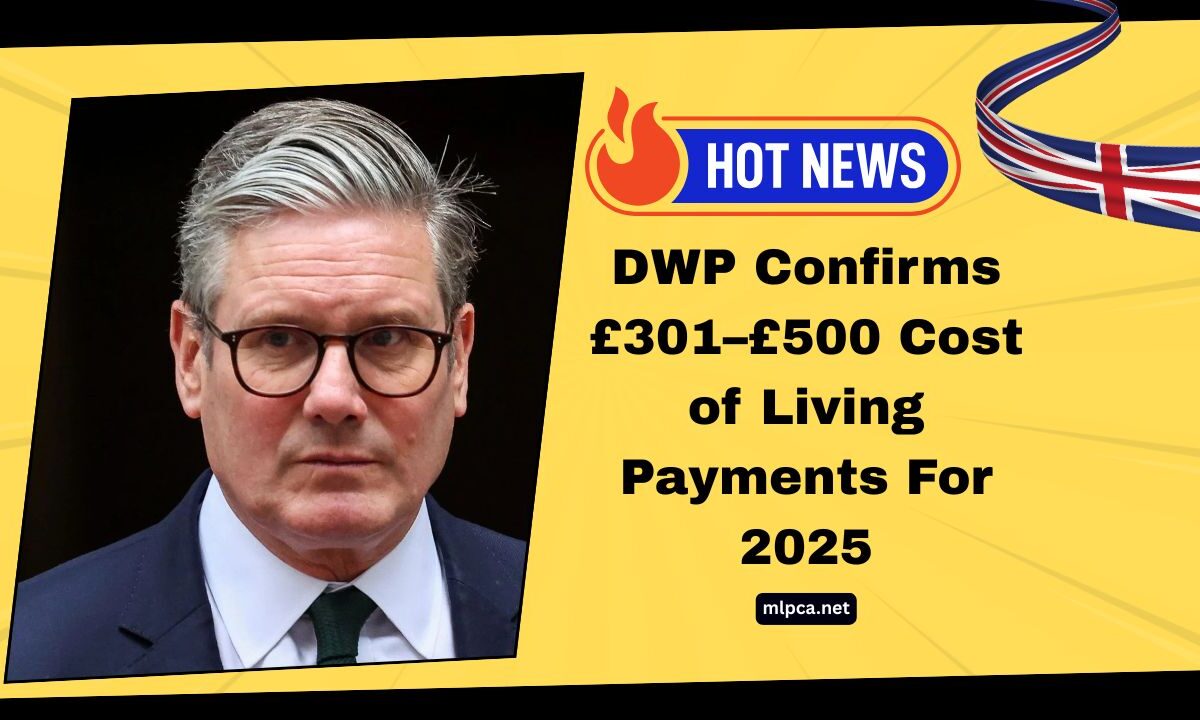As the cost of living continues to strain UK households, the Department for Work and Pensions (DWP) has officially announced a £301 to £500 Cost of Living Payment plan for 2025.
These payments aim to assist low-income households, pensioners, carers, and disabled individuals, ensuring financial relief during critical times of the year.
Let’s break down the full details, eligibility criteria, payment schedule, and how these payments work.
Cost of Living Payment Breakdown for 2025
To spread financial relief throughout the year, the DWP will issue payments in three phases:
| Payment Phase | Date Range (2025) | Amount | Details |
|---|---|---|---|
| Spring Payment | March – May | £301 | Initial support to combat spring expenses |
| Summer Top-Up | July – August | Up to £200 | Additional aid during summer inflation |
| Autumn Support | October – December | Variable (up to £500 total) | Based on household need |
The maximum total payment one may receive through this scheme is £500 in 2025.
Eligibility Criteria: Who Will Receive the Payment?
One of the biggest benefits of this scheme is automatic enrollment. If you already receive any of the following means-tested benefits, you are likely eligible:
- Universal Credit
- Income-based Jobseeker’s Allowance (JSA)
- Income-related Employment and Support Allowance (ESA)
- Income Support
- Pension Credit
No separate application is required—payments will be deposited automatically into the same bank account where you receive your DWP benefits.
However, it’s crucial to keep your account and personal information updated. Changes in income, bank account, or personal circumstances could affect eligibility or delay payments.
Extra Support for Disabled Individuals, Carers & Medical Needs
In addition to the general Cost of Living Payments, special provisions exist for those under more financial pressure:
- Disabled individuals: May receive an extra £150–£200 for daily living and medical expenses.
- Carers: Individuals caring for the elderly or disabled may get up to £500 in total support.
- Medical equipment users: Households using oxygen machines, electric beds, or high-power devices may be eligible for additional energy bill support.
Payment Process: What You Need to Do
Although the system is largely automatic, beneficiaries must ensure:
- Eligibility benefits are active (e.g., UC, ESA, JSA).
- Bank account and contact information are up to date.
- Personal portals (like the Universal Credit account) are regularly checked for updates.
If you haven’t received your payment on time, review your details first, then contact DWP if needed.
Other Government Schemes That Add Extra Support
The DWP Cost of Living Payment works in tandem with several other support schemes:
| Scheme | Support Offered |
|---|---|
| Warm Home Discount | Up to £150 off energy bills in winter |
| Winter Fuel Payment | Extra heating cost support for pensioners |
| Household Support Fund | Vouchers, grants, and essentials from local councils |
When combined, these programs offer year-round financial relief to millions of households.
The 2025 Cost of Living Payments from the DWP bring vital relief for those already facing financial hardship.
With a structured three-phase rollout and targeted aid for disabled individuals and carers, this scheme is a cornerstone of the UK’s social support system.
To maximize your benefits, ensure all your details are up to date and stay informed on related programs.
Whether you’re struggling with rising bills or supporting a vulnerable household member, this payment could provide the much-needed economic buffer.
FAQs
Do I need to apply separately for the 2025 Cost of Living Payment?
No, if you’re already receiving an eligible benefit like Universal Credit or Pension Credit, the payment will be sent automatically.
When will I receive the payments in 2025?
Payments will be distributed in three phases—Spring (£301), Summer Top-Up (up to £200), and Autumn support, totaling up to £500.
What should I do if my bank details change?
You must update your information immediately on the DWP portal or Universal Credit account to avoid delays or missed payments.

